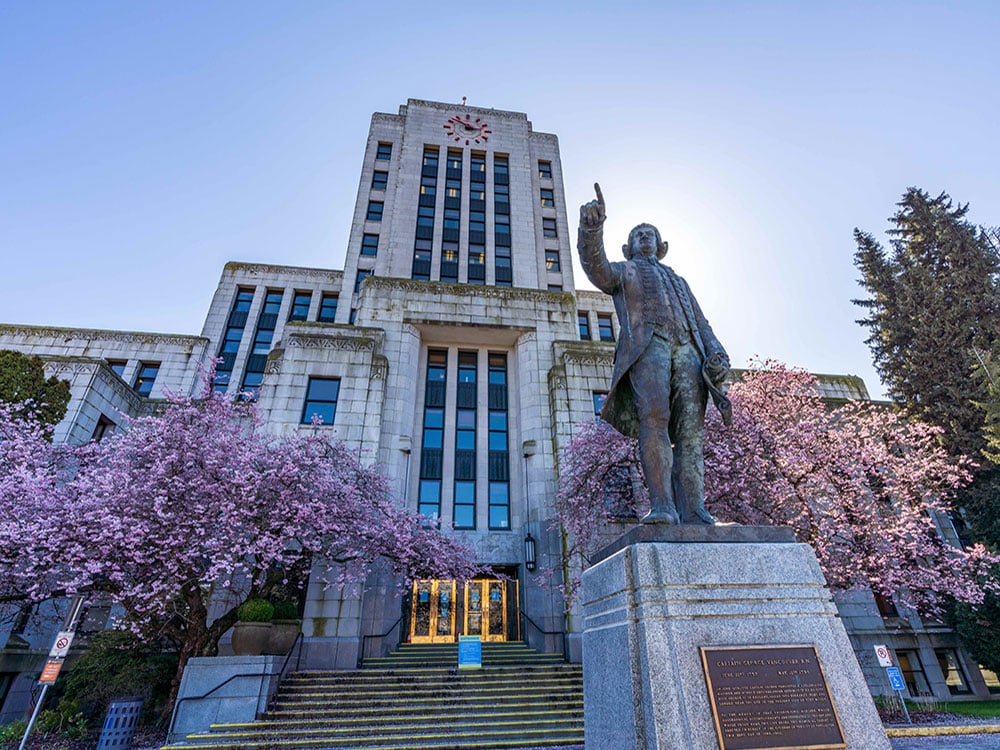In 2017, the City of Vancouver committed to ensuring its employees — and workers for city contractors — were paid enough to live there.
At the time, Vancouver was the biggest employer in the country to offer a living wage based on the cost of rent, food and other necessities.
“It was the largest living wage municipality, and it did a tremendous job over the years in encouraging other businesses to sign on,” said Anastasia French, the director of Living Wage for Families BC. Then-mayor Gregor Robertson told media it was a way to guarantee workers “a basic level of opportunity” in an expensive place to live and work.
On Jan. 31, Vancouver city council voted in a closed meeting to cancel the policy, which covered both city employees and workers for contractors.
Vancouver Mayor Ken Sim pointed out in a prepared statement that the living wage defined by Living Wage for Families BC rose 17.6 per cent this year, a product of rising rents and food costs. Sim said the city would instead transition to paying workers a minimum salary based on a five-year average of the living wage, which changes year-to-year.
But unions and some city councillors say the change denies some workers a needed pay boost.
“They are telling the people who help keep Vancouver running that their labour may be welcome, but they and their families are not,” said the BC Federation of Labour in a statement.
Other activists worry the city’s withdrawal from a program it once championed will hurt support for living wage programs.
“I’m concerned it’s going to reverberate across the province,” said CUPE 15 president Warren Williams, whose union represents thousands of city staff.
The living wage is calculated as the amount of money two income-earners would need to support a family of four in a given municipality. Employers certified by Living Wage for Families BC agree to increase their base rate of pay in line with that wage, which factors in the cost of rent, child care, food and other basics.
This year, the Canadian Centre for Policy Alternatives said the living wage in Vancouver rose from $20.52 to $24.08 an hour, due largely to rising food costs. The centre also changed how it calculated rental cost to reflect the disparity between new renters and long-time tenants who benefit from rental protections.
On Feb. 27 CBC News reported Vancouver was considering ending the living wage.
In fact, the decision to axe the policy had been made a month earlier. Coun. Pete Fry said the vote happened at a Jan. 31 meeting held in camera, meaning councillors couldn’t disclose what happened or how their peers voted.
“It definitely had a bearing on the budget decision we just made,” Fry said. Last week city council — which is controlled by Sim’s ABC party — voted to pass a budget including a 10.7-per-cent property tax hike and a big boost to police funding.
Sim said most city employees were already paid more than the 2023 living wage. He also said that paying workers a wage based on the five-year average was “more practical” and would “smooth out annual fluctuations for workers and contract employees.”
French said the organization does allow certified employers to pay less than the living wage if they provide other benefits to make up for it. But it doesn’t let them pay an average based on costs in previous years.
“You can’t negotiate your rent based on what it was five years ago,” French said.
The city also said paying a minimum wage that fluctuates every year was difficult given its obligations under collective agreements. But Williams, the union leader, doesn’t buy that. He says the change is most likely to affect contractors like tow truck drivers, security guards and cleaners.
“One of the big concerns I have is that this opens the door for contractors to low ball,” Williams said.
Fry and fellow Coun. Christine Boyle confirmed they both voted against the motion.
“The living wage is an important indicator of what it actually costs to live in Vancouver,” Boyle said. “People who work for the City of Vancouver should be able to afford to live here. That’s a pretty basic expectation.”
The Tyee reached out to Sim’s office for additional comment, including what sticking with the living wage program might have cost, but did not hear back by publication time.
The living wage project was created as a way to bridge the gap between the legislated minimum wage and what it actually costs to live in a city like Vancouver. Today, French’s organization boasts more than 250 certified living wage employers. In 2017, the B.C. government even tasked a commission with investigating the transition from a minimum to a living wage, though its most recent report has yet to be completed.
But French said Vancouver’s withdrawal is a blow for the program. The city was the largest municipality to guarantee a living wage.
Other participating cities have made no sign of leaving the program. The City of Victoria recently recertified as a living wage employer this year. The City of New Westminster confirmed in a statement it had no plans to leave the program. City of North Vancouver Mayor Linda Buchanan said in a prepared statement that paying the living wage was more important than ever given the rising cost of living in the region.
“Local governments have a responsibility to ensure that those who we do business with are paying their employees a wage that will allow them to live in the community where they work,” Buchanan wrote. “As mayor, I am committed to upholding our Living Wage Employer certification, full stop.”
But French fears Vancouver’s withdrawal would have a “chilling effect” that could push employers to either abandon the program or reconsider joining.
“We are nervous about that,” she said.
Vancouver and District Labour Council president Stephen von Sychowski slammed the city’s decision, particularly the fact it happened in a closed meeting. He noted the city staff who are affected by the policy change were already on the lowest end of its pay spectrum.
“Decertifying as a living wage employer saves a small amount of money on the backs of people who need it the most,” von Sychowski said.
French acknowledged some employers may be struggling to keep paying the living wage given the increase this year. But many small businesses participating in the program say they are making it work. Patricia Massy, the owner of Massy Books in Chinatown, says offering a living wage is a matter of pride for her business in one of the most expensive cities in North America. She added that it has helped her retain employees at a time the labour market is tight.
“I’m not trying to shame anybody for not being a living wage employer, but I’m certainly not going to hold back from shaming the city,” Massy said.
“Those are essential services, and it just seems so wrong to cut the wages of the people at the lowest end of the pay grade when they’re already getting paid the least.” ![]()
Read more: Rights + Justice, Labour + Industry, Municipal Politics
















Tyee Commenting Guidelines
Comments that violate guidelines risk being deleted, and violations may result in a temporary or permanent user ban. Maintain the spirit of good conversation to stay in the discussion.
*Please note The Tyee is not a forum for spreading misinformation about COVID-19, denying its existence or minimizing its risk to public health.
Do:
Do not: